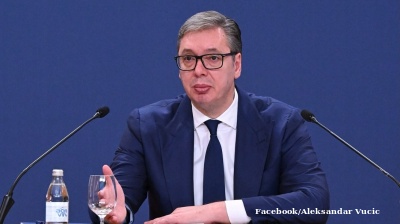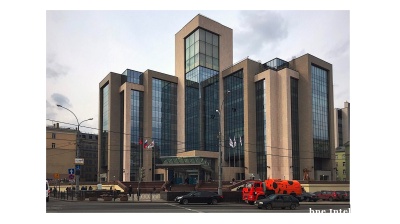Brexit was a real shock for everyone. Even though we knew that both the 'Remain' and 'Leave' camps were running neck and neck, most people I know believed that even though it would be a close run thing, Brexit wouldn't happen. A Brexit would lead to too many problems in economics, in politics, in international relations, even on an emotional level for it to be a serious proposition. For most people I know, Brexit was some kind of a nightmare; now it has become a reality.
The consequences of the UK leaving the EU obviously will have a global impact and Ukraine will be one of the countries most affected by the decision, so it has the most reasons to be concerned.
First and foremost, Ukraine has one less strong partner in the EU. We lost a friend that understood how crucial Ukraine’s role is for European security and what the real face of Russian renewed imperialism looks like.
The UK has always supported the politics of sanctions against Russia and was always there when any EU member state needed to be reminded of the importance of sanctions for the restoration of peace. With Britain out of the EU, the pro-sanctions camp will be significantly weakened.
Moreover, financial markets have already reacted to Brexit and this reaction brings nothing good to the UK, nor to the EU. A worsening economic situation, or even the threat of it, will make European states even more reluctant to prolong sanctions against Russia.
Secondly, Brexit will force the EU to be more focused on its internal problems and consequently pay less attention to the external challenges. Russian troops are still on Ukrainian soil in Crimea and in the Donbas region, and no one can be entirely sure there won't be another escalation in violence. Vladimir Putin has already proved several times that he doesn't waste any opportunities to improve his hand in Ukraine when the world’s attention is occupied elsewhere. Just remember the winter of 2014: who was listening to Ukraine’s cry of despair as his “little green men” were leaving Russian military bases and occupying the Crimean peninsula ahead of that “exit referendum”, while the pompous opening of the Winter Olympics in Sochi was underway. Today, when everything is about speed of reaction, losing crucial time in trying to break into the world's news headlines can be very costly.
Moreover, the UK is one of only a handful of EU states that understand the seriousness and scale of Russia's propaganda and disinformation activities in Europe. Taking into account the EU’s passivity in this regard and even lack of general acknowledgement that Europe is a target for Russian propaganda, having such a strong partner leave the EU will be a real loss for the anti-propaganda camp. Obviously, Brexit doesn’t mean that the UK’s voice in this matter will vanish, but being out will considerably limit its influence over European affairs.
Right after the Brexit vote, some Ukrainian analysts argued that the troubles inside the EU would mean that Ukraine’s road towards potential membership will become even longer and more problematic. At the same time, they advised Ukrainian authorities to strengthen Ukraine’s position in the Caucasus and Central Asia, instead of focusing all its diplomatic efforts on Europe. Brexit might influence the position of supporters of European integration as well. You don’t have to be a genius of Russian propaganda to come to the conclusion: “So why would anyone like to join EU, if EU member states are leaving it?"
But there is more to it than that. Both April's Dutch referendum and Brexit show that there’s a deep ideological crisis at the heart of the EU. Nations that have been benefiting from a united Europe for so long are no longer attracted by the concept of a union. Clearly, the EU is not any more seen as a idea that integrates nations, but as a monstrous bureaucratic machine aimed at regulating every field of life. This has to change if we don’t want to see further referendums in other EU member states. Taking into account the growing popularity of right-wing, nationalist movements across the continent, if we don’t find a solution for keeping the Union together, what kind of Europe will we have in a few years?
A call to unity
So this is a call not only for to leaders of European countries, but to European citizens, especially the continent's youth. You should be responsible for your future and stand up for it, starting by taking part in referendums, elections and declaring your point of view. Recent referendums in Europe showed that older, lower income and less-educated people are more likely to be anti-EU. Do you want these people to decide your future? In Ukraine we still have a bitter joke about elections: “Save your future – hide your granny’s passport.”
In Ukraine we already paid the price of passivity during elections, which allowed people with Soviet sentiments to choose the now-ousted former president Viktor Yanukovych and his cronies to lead our country. It took us, the young and educated generation, a revolution and more than hundred killed to bring our country back onto the European path.
As surprising it may sound, Europe needs Ukraine more than ever. I hope Brussels will be able to understand that we could be part of a solution for the current European identity crisis. Ukraine is more pro-European than most of the EU member states and has proven its readiness to change for the EU. Obviously, Brussels could come up with institutional changes aiming at decreasing the level of Euroscepticism, but in the long run no institutional changes can save the Union if no one believes in it any more. The EU needs the fresh blood of Euro-optimists that will bring more enthusiasm to European politics. Ukraine has this enthusiasm.
This comment is far more personal than one could imagine. I was following the Brexit updates with a bleeding heart, realizing that the EU I know, which I’m used to, is dying. Yes, my country is not part of the EU, but I am European; the fate of European nations is not irrelevant to me. During the Euromaidan revolution I took a risk to bring Ukraine closer to Europe.
After the revolution I went to the College of Europe to study the EU better, to learn what changes Ukraine needs to go through to apply for membership. I studied the history of European integration, learning how complicated this process was and upon how many compromises the EU is built. Yes, it is not a perfect creation, but it is worth working to make it better, not to simply turn away when you have had enough of it. In fact, observing it from the outside sometimes makes me angry: why, I ask myself, do those who criticize the EU forget to acknowledge that they live in peace and prosperity thanks to it! It is almost certain that Europe won’t be as strong if the EU didn’t exist. It is thanks to cooperation and the mutual understanding of the member states that everyone can enjoy stability and growth. As a person from a country that in the face of Russian aggression had to build a pro-Ukraine coalition almost from scratch, piece by piece, trust me, it’s not good to be alone. Whatever the challenge is, it is always easier to fight it together with others.
The EU is much more than just a single market or eurocrats. It’s a process, a concept, a dream come true. It is an idea of unity and strength that inspired me and millions of other people – not just Ukrainians. European nations, you have managed to build something strong and successful. Yes, it is not perfect, but nothing is. There’s always a chance to reform the EU. I respect the decision of a majority of people, but I believe Brexit is a mistake. Friends from all around Europe, it is a wake-up call for you to make sure such mistakes are not repeated in the other member countries.
Activist, journalist and co-founder of Global Ukrainians, an international network of Ukrainians worldwide, Kruk was awarded the Atlantic Council Freedom Award for her work communicating the Maidan revolution to the world. She predicted a frozen conflict in July 2014, which has largely come to pass, and now comments on the progress of crucial reforms in Ukraine.
Opinion

Armenia’s painful reorientation toward the West
Yerevan’s drive to break free from its dependency on Moscow is generating profound internal political turbulence and exposing it to new external risks, says a report by the Central Asia‑Caucasus Institute & Silk Road Studies Program.

COMMENT: Europe’s “fake it till you make it” war approach cannot hold off Russia’s trillion dollar war machine
In their speeches on the war in Ukraine, European leaders appear like a video clip looped on repeat. Standing before the cameras they declare new packages of support for Kyiv and threaten new measures to pressure Russia as if it was still 2022.

A year after the Novi Sad disaster, Belgrade faces one crisis after another
Serbia’s government is grappling with a convergence of crises which threaten to erode President Aleksandar Vucic’s once-dominant position.

Don’t be fooled, Northern Cyprus’ new president is no opponent of Erdogan, says academic
Turkey’s powers-that-be said to have anticipated that Tufan Erhurman will pose no major threat.



